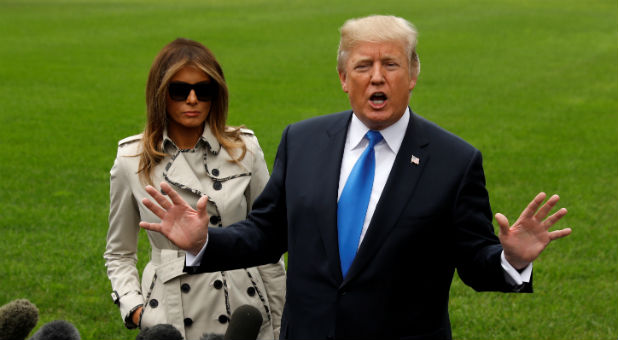Have Evangelical Leaders Become Disciples of Donald Trump?
A headline on the conservative, RedState website announces, “Trump’s Cheap ‘Merry Christmas’ Christianity Continues to Sway Evangelicals.” Is this true?
According to Kimberly Ross, “Last year, congregants at the Church of Trump stormed into polling places nationwide and voted a godless reality star into the highest office in the land.”
But that was only the beginning. Since then, Ross claims, “It’s been crystal-clear that too many evangelical Trump supporters have not only placed their political faith in the real estate magnate; they have become sold-out disciples for him. It seems as if, in their eyes, the GOP and Christianity are interchangeable.”
What prompted Ross to pen this article now, in Oct. 2017? It was President Trump’s appearance at FRC’s Values Voter’s Summit. He was the first sitting president to speak at this annual D.C. summit, and he received a thunderous response when he made clear that we would be saying, “Merry Christmas” again. In the words of Ross, “Home run! And the crowd … goes … wild.”
Yes, “The proud, starry-eyed evangelicals who cast their ballot for the Christian-in-chief believe Trump has miraculously brought faith back to the nation.
“And that is all that matters.”
Is Ross being fair? Yes and no—and that is a very big no.
On the “yes” side, it is true that we evangelicals can be guilty of making “Merry Christmas” into a big deal, no doubt the result of what we perceive to be the constant attack on our faith. So, when the president pushes the right button and uses the right line in the right setting, he’s sure to get a response.
Overall, saying “Merry Christmas” is the least of our concerns, and Ross’ criticisms here are fair.
It’s also true that some evangelicals have been guilty of turning Trump into Saint Donald. He is presented (by a precious few) as a truly Christian man who can do no wrong, a selfless champion of the people whose most unbecoming tweets are justified because of the fierceness of the battle. He is one of us, and he is our hero!
I addressed this concern during the campaign, and since the election, I have urged my fellow evangelical leaders not to sell their souls in defense of our president. We only discredit ourselves when we ignore his shortcomings.
Worse still, we hurt our witness. People are less likely to hear our message about Jesus when we seem oblivious to the president’s clay feet.
Having said this, I believe that in other, more serious ways, Ross has missed the boat.
In my experience, most evangelical leaders do not turn a blind eye when Trump speaks or acts in a way that we find objectionable. And I know very few leaders who voted for him without reservation, as if we had no reason to be concerned. (For my own reflections last October, see here.)
Instead, we were voting against Hillary, we were voting for someone who would take on the system (including the Republican establishment), and we were voting for a man whom we hoped God could use despite there being no evidence that he was an evangelical Christian. In other words, we voted with our eyes wide open, and we continue to have our eyes wide open.
But were we unjustified in some of our expectations? Were we wrong in thinking that he would stand for religious liberties? Were we wrong in thinking that he would nominate pro-life, conservative justices to the Supreme Court and federal courts? Were we wrong in thinking that he would stand against radical LGBT activism? Were we wrong in thinking that he would be a friend of Israel?
Even Ross admits that “some of Trump’s presidential actions have indeed been worthy of praise by communities of faith (see his recent protection of religious liberty).” But, she continues in the same sentence, “It is his cheap brand of convenient, crowd-pleasing, substance-free Christianity that is truly loathsome.”
I concur that this brand of “Christianity” is loathsome, but it’s not the brand I’m embracing, nor is it the brand my evangelical colleagues are embracing. Instead, we see our biblically-based, sacred, evangelical faith for what it is, and we see the president for who he is: An ally and friend; a fearless, strong-headed leader; a rough and tumble, often impetuous, sometimes unwise, even divisive commander in chief.
But he is not the representative of our faith, nor do we look to him to be a Christian leader, let alone the “Christian in chief.” To repeat: Our eyes are wide open.
At the same time, we will be quick to thank him for doing good, we will stand with him against unfair criticism, and we will pray that he will truly know and walk with the Lord.
In my opinion, Ross is reading far too much into the president’s speech at the Values Voter Summit, as if the audience should not have appreciated his presence there—again, he was the first sitting president to address this convention—and as if they should have booed, rather than cheered, when he made his “Merry Christmas” comments.
Most evangelicals I know grimace when he sends out a “Psycho Joe” tweet but rejoice when he appoints a Neil Gorsuch to the Supreme Court. They’re willing to put up with the former for the sake of the latter, although they wish the former would finally stop. And you can be assured they are not mistaking Donald Trump for the apostle Paul. Trust me on that.
















































